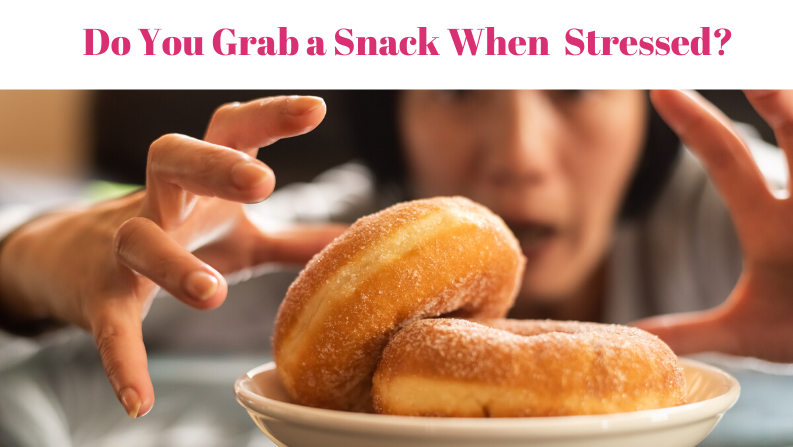Have you ever caught yourself in a situation when you eat more than you should after a busy and hectic day? I think maybe you have experienced this. I know I have. All of us have. The truth is stress and the hormones it releases make us overeat and we usually end up eating a whole chocolate bar even though we planned to take just a few bites.
We just act on impulse in order to feel a bit better, even for a moment only.
Temporary Stress Effects on Appetite
The part of the brain called the hypothalamus unleashes corticotropin-releasing hormone, which suppresses appetite but only in the short term. Plus, the brain sends signals to the adrenal glands to release the epinephrine hormone, also called adrenaline.
Then, this hormone triggers the body’s fight-or-flight response – a psychological state in which the body suppresses appetite and puts eating on hold.
Perceived Stress Effects on Appetite
However, when it comes to stress that is perceived and persistent, the story and the effects are quite the opposite. Indeed, in case of persistent stress, a hormone called cortisol is released from the adrenal glands. And, cortisol is known to increase motivation in general, including the motivation to eat.
“Increased Motivation to EAT!”
When we are stressed and have high cortisol levels we have an increased motivation to eat.
Cortisol is hormone that can increase appetite. The levels of cortisol should go down when stress disappears. But, if it lingers a bit longer, the cortisol levels may keep being increased.
Fat and Sugar Cravings
Unfortunately, stress doesn’t only increase appetite, it also has an effect on food choices. Correct me if I am wrong, but I am guessing you do not have veggies or fruit on your mind. I’m thinking it’s more sugary sweets treats or maybe some salty, high fat chips or some other fattening snacks.
According to a few studies, physical and emotional distress can lead to an increased intake of foods that are either high in fats or sugar or even both. This effect usually occurs when high cortisol levels combine with high insulin levels. There is also the hunger hormone called ghrelin may be contributing to this change in eating behavior.
Feedback loop and emotions
Once the high fat or sugary sweet foods are eaten, there’s kind of a feedback effect impeding activity in the part of the brain responsible for producing and processing stress and similar emotions. So, we may conclude that sugar cravings occur simply because they fight stress.
Also keep in mind that overeating isn’t the one and only thing that can add some extra weight. The truth is that stress can cause people to suffer from lack of sleep, reduced desire to exercise and excess of alcohol intake, all of which can add on extra pounds and lead to becoming overweight.
Different Responses to the Same Stress
Surprising but true, (well maybe not actually) research suggests that there is a difference in the way women and men cope with stress. For example, women are far more likely to relieve their stress using food, whereas men usually turn to alcohol or smoking. (As we know, not good habits to get into either)
Women vs. Men – Are we really different?
A study conducted in Finland with more than 5,000 women and men showed that obesity was only linked to stress-related eating in women only, not in men. On the other hand, another research study claimed that both genders can be affected by obesity as a result of high stress levels, with a greater effect on men.
Furthermore, some researchers from Harvard University pointed out that work-related stress and other issues are connected to weight gain, but only in those who were already overweight before the study period began. One possible explanation for this is that overweight people already have increased levels of insulin which increases the chances of stress-weight gain.
More Research
Another factor that affects stress-related weight gain is the amount of cortisol people release when responding to stress. A group of British researchers conducted a study which showed that people who usually respond to stress with elevated cortisol levels tend to turn to snack in response to everyday hassles.
Here’s the Truth
The truth is here, that every one of us reacts differently to stress and your stress response is different than mine. This leads me to believe that research that studies stress responses needs to be viewed generally and we need to look at what works individually. Each one of us can change the way we respond to stress with a mindful intention. So, what can you do to improve your stress response?
Steps You Can Take
Even though different research point to different results, there are some proven steps you can take to reduce stress and lower the risk of overeating. Here are three of the best options:
1. Meditation
We have all heard about it, and yes, it is true – meditation benefits your body in many ways including reduced stress. Apart from lowering your stress levels, meditation will help you lower high blood pressure and keep you safe from heart diseases. What’s more, if you meditate you are far more likely to make smart food choices and stifle the impulse to grab unhealthy food. Want to get a few tips and tricks to get you started with meditation? Join me on Mondays for Meditation Monday on our Facebook page.
2. Exercise
Another great thing you can do to reduce stress is exercise. Namely, intense exercise can increase the cortisol levels momentarily, whereas exercise which is low in intensity can reduce them. A research done in 2010 by the University of California researchers shows that high-intensity exercise can reduce the negative effects of stress. And, if you aren’t so sure about vigorous exercise, you can do yoga or tai chi which is a combination of both meditation and exercise. Move you body for 30 minutes each day. This is one sure fire way to help with stress.
3. Social Life
Finally, spending time with people you love has a buffering effect on stress. In other words, people cope with a stressful situation more easily when having a social network. Now, I know what you are thinking…We are in a social distancing world right now, how am it supposed to have a social network that helps reduce stress? You need to use the phone or online video chat systems to keep yourself connected. Arrange with your girlfriends to meet for coffee over video chat. Call a friend just to chat and check in. Call or text family members so that you are connected every day. These are ways to stay connected without being in the same personal space.
Finally
The thing is, I realize that we are in trying times, that stress is high and we are all trying to find ways to cope. I want you to know that your feelings are real and that it is okay to have feelings of stress and anxiety. It’s important to understand though, even when things are hard, we can have a healthy response and we can choose Joy and not food.
Here’s to your wellness! ~Amy
Want to a way to stay on top of your well-being for the next 8 weeks? Join the #8tofeelgreat Wise & Well – The Challenge. Click Here

